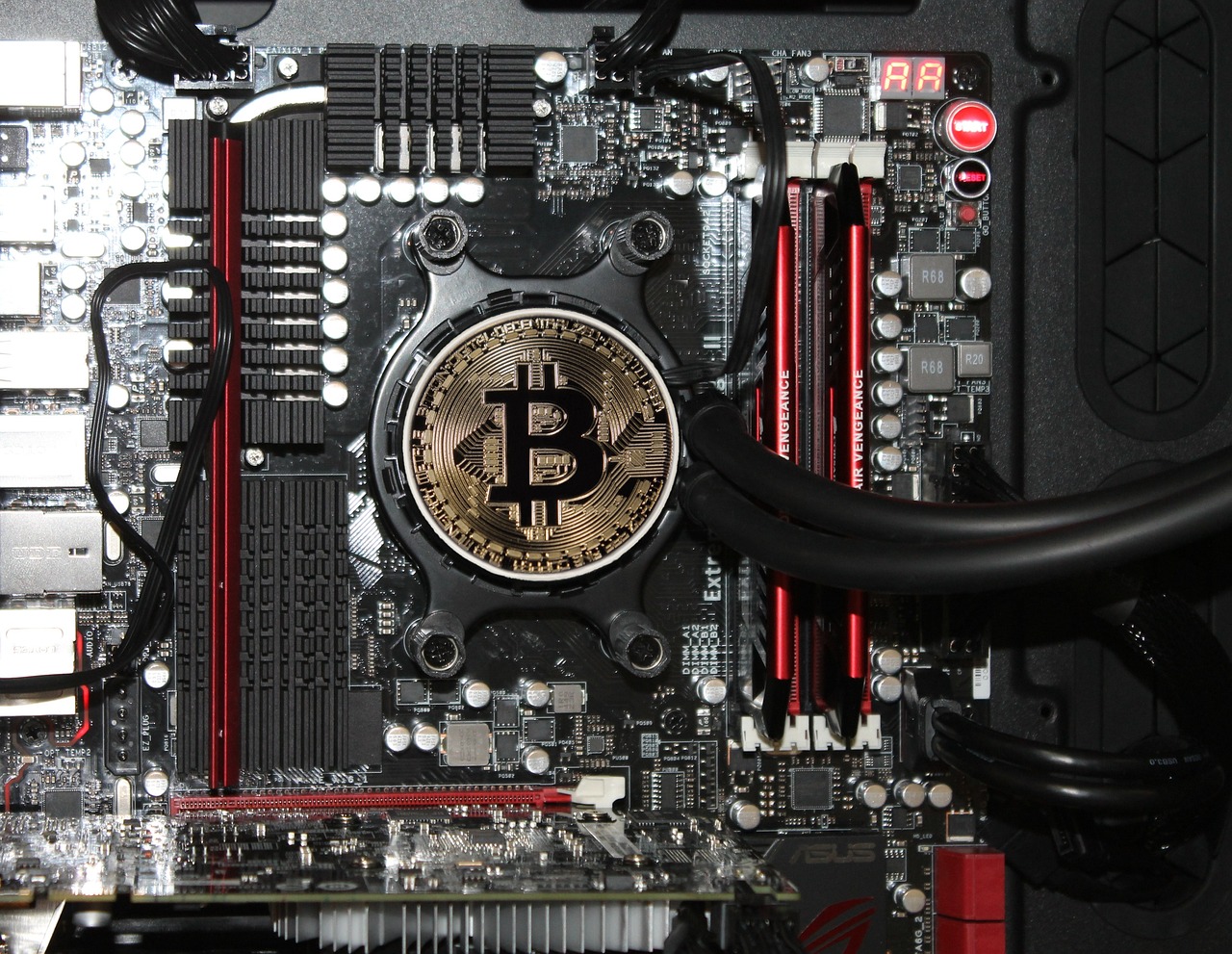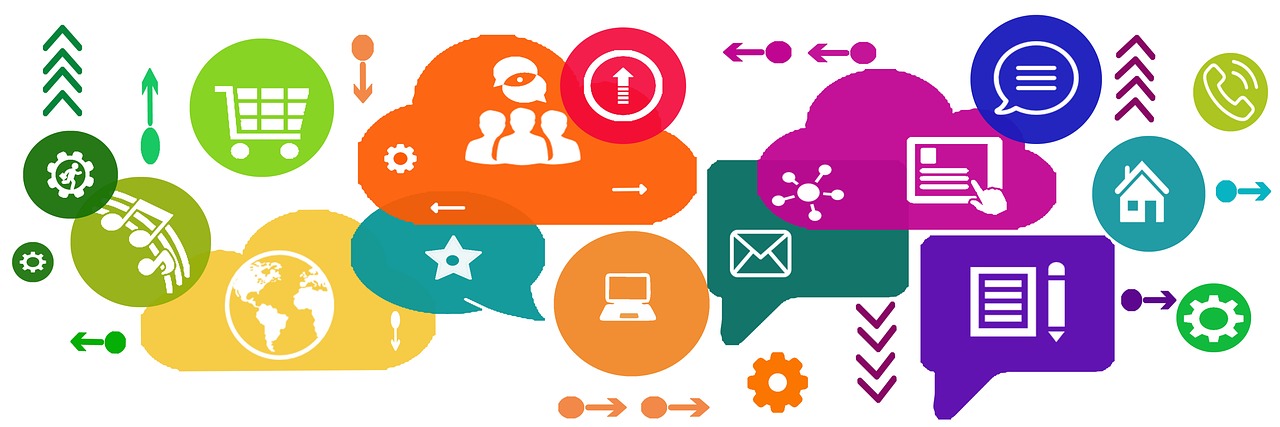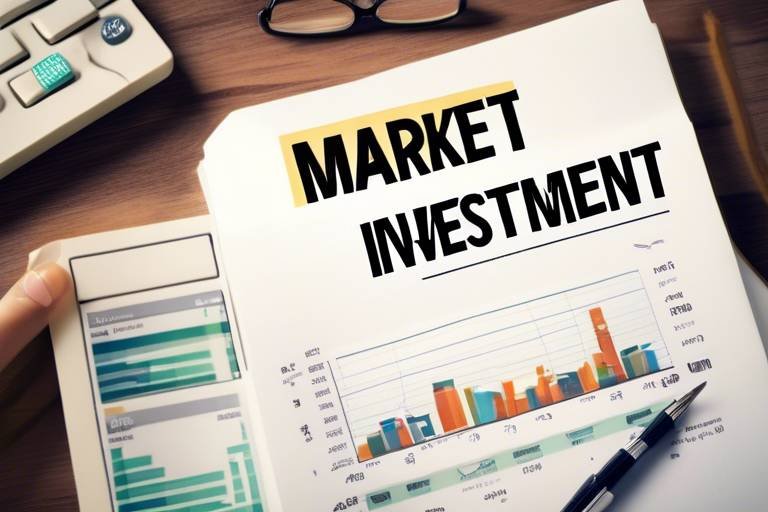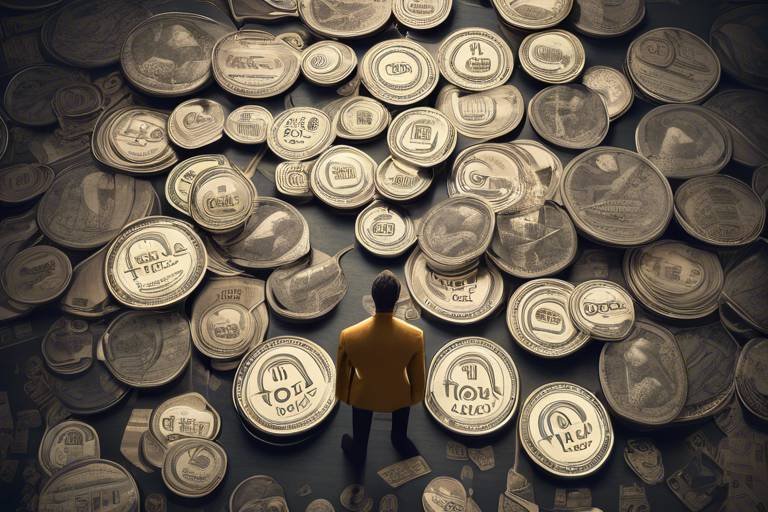Market Analysis - The Future of Blockchain in Supply Chains
In the ever-evolving world of logistics, the integration of blockchain technology into supply chains is not just a trend; it's a revolution. Imagine a world where every transaction is recorded securely, where every product can be traced back to its origin, and where trust is built into the very fabric of the supply chain. This is the future that blockchain promises—a future that is already beginning to unfold. As we delve deeper into this topic, we'll explore how blockchain is reshaping supply chains, the trends that are emerging, and the challenges that companies must navigate to harness its full potential.
To appreciate the transformative impact of blockchain on supply chains, we first need to grasp its fundamentals. At its core, blockchain is a decentralized digital ledger that records transactions across many computers. This decentralization ensures that no single entity has control over the entire chain, enhancing transparency and security. Each block in the chain contains a list of transactions, and once a block is filled, it is added to the chain in a linear, chronological order. This structure not only makes it nearly impossible to alter past records but also offers a clear, auditable trail of each transaction. For supply chains, this means improved efficiency and accountability, as all stakeholders can access the same information in real-time.
The integration of blockchain technology into supply chains is not merely theoretical; it's happening right now. Companies across various industries are adopting blockchain to enhance operational efficiency. Some of the latest trends include:
- Real-time tracking: With blockchain, businesses can monitor their goods as they move through the supply chain, providing unprecedented visibility.
- Smart contracts: These self-executing contracts automate processes and reduce the need for intermediaries, leading to faster transactions.
- Enhanced collaboration: Blockchain fosters better communication and cooperation among all parties involved, from suppliers to retailers.
One of the standout features of blockchain technology is its ability to provide real-time tracking of goods. Imagine being able to pinpoint the exact location of a shipment at any given moment. This capability not only improves visibility but also boosts accountability throughout the supply chain. Companies can quickly identify delays or issues and address them proactively, leading to smoother operations and enhanced customer satisfaction.
Several companies have already reaped the benefits of integrating blockchain for real-time tracking. For instance, Walmart has implemented blockchain to trace the origin of food products, significantly reducing the time it takes to track down contaminated items. Similarly, Maersk has partnered with IBM to create a blockchain-based platform that streamlines shipping processes, improving efficiency and reducing costs. These case studies not only highlight the advantages of blockchain but also provide valuable lessons for other organizations looking to adopt this technology.
Despite its numerous advantages, the adoption of blockchain for real-time tracking is not without challenges. Companies often face technological hurdles, such as the need for robust infrastructure and integration with existing systems. Additionally, regulatory hurdles can complicate matters, as businesses must navigate a complex landscape of laws and standards. Overcoming these challenges requires careful planning and a willingness to invest in the necessary technology and training.
Another exciting aspect of blockchain technology is the use of smart contracts. These are self-executing contracts with the terms of the agreement directly written into code. By automating processes, smart contracts reduce the need for intermediaries and minimize the risk of fraud. Imagine a scenario where payment is automatically released once goods are delivered and verified. This not only speeds up transactions but also enhances trust among supply chain participants.
The benefits of adopting blockchain technology in supply chains are significant. Companies can expect to see increased efficiency, reduced costs, and improved traceability of products. The transparency that blockchain offers is a game changer, enabling businesses to build trust with consumers and partners alike.
By reducing fraud, errors, and administrative overhead, blockchain can lead to substantial cost savings. For instance, automating processes through smart contracts eliminates the need for manual verification, thus reducing labor costs. Additionally, the enhanced traceability provided by blockchain can help companies avoid costly recalls and compliance fines.
In today’s market, consumers are increasingly concerned about the origins of their products. Blockchain facilitates better traceability, ensuring compliance with regulations and enhancing consumer trust. When customers can see the journey of a product from farm to table, they are more likely to feel confident in their purchases.
Despite its potential, several challenges hinder the widespread adoption of blockchain technology in supply chains. Companies often struggle with integration issues, as existing systems may not easily accommodate blockchain solutions. Furthermore, the lack of standardization across the industry can create confusion and impede progress.
The regulatory landscape surrounding blockchain is still evolving, and companies must navigate a complex web of laws and standards to ensure compliance. This can be particularly challenging in industries with strict regulations, such as food and pharmaceuticals.
Integrating blockchain with existing supply chain systems can be a daunting task. Organizations may face difficulties in aligning new technologies with legacy systems, requiring significant investment in both time and resources.
Looking ahead, the future of blockchain technology in supply chains appears promising. As more companies recognize its potential, we can expect to see significant advancements that could further revolutionize the industry.
Upcoming innovations, such as the integration of artificial intelligence (AI) with blockchain, could unlock new possibilities. Enhanced data analytics capabilities will allow businesses to make more informed decisions, optimizing their supply chains in ways we can only imagine.
The long-term implications of widespread blockchain adoption in supply chains could lead to shifts in market dynamics and competitive advantages. Companies that embrace this technology early may find themselves ahead of the curve, establishing themselves as leaders in their respective industries.
- What is blockchain technology? Blockchain is a decentralized digital ledger that securely records transactions across multiple computers.
- How does blockchain improve supply chains? It enhances transparency, security, and efficiency, allowing for real-time tracking and improved collaboration.
- What are smart contracts? Smart contracts are self-executing contracts with the terms directly written into code, automating processes and reducing the need for intermediaries.
- What challenges does blockchain face in supply chains? Companies often encounter integration issues, regulatory hurdles, and technological challenges when adopting blockchain.

Understanding Blockchain Technology
Blockchain technology is often described as a revolutionary force that is reshaping industries, but what exactly does it entail? At its core, blockchain is a decentralized digital ledger that records transactions across multiple computers. This decentralization is crucial; it means that no single entity has control over the entire chain, which significantly enhances security and transparency. Imagine a digital notebook that everyone can see but no one can erase or alter—this is the essence of blockchain.
To dive a bit deeper, let’s explore some of the fundamental characteristics of blockchain:
- Transparency: Every transaction is recorded in a public ledger, allowing all participants to view the history of transactions. This level of visibility fosters trust among stakeholders.
- Immutability: Once a transaction is added to the blockchain, it cannot be changed or deleted. This feature prevents fraud and ensures the integrity of the data.
- Security: Transactions are encrypted and linked to the previous transaction. This cryptographic security makes it exceedingly difficult for hackers to manipulate the data.
- Decentralization: The absence of a central authority means that the system is less vulnerable to failures or attacks that could compromise a single point of control.
The implications of these characteristics are profound, especially in supply chain management. By leveraging blockchain, companies can facilitate real-time tracking of goods, ensuring that all parties involved—from manufacturers to consumers—have access to the same information. This can significantly reduce disputes and increase efficiency. For instance, if a product is delayed, all stakeholders can see the real-time status of the shipment, allowing for quicker resolutions and adjustments.
Moreover, blockchain enables the use of smart contracts. These are self-executing contracts with the terms directly written into code. When predefined conditions are met, the contract automatically executes, eliminating the need for intermediaries and reducing the chances of human error. Picture a vending machine: you insert your money, select your item, and the machine delivers it without needing a cashier. Smart contracts operate on the same principle, providing a seamless and efficient transaction process.
As we continue to explore the transformative potential of blockchain technology in supply chains, it’s essential to recognize that while the benefits are substantial, the journey to adoption is not without its challenges. Companies must navigate a complex landscape of integration issues, regulatory hurdles, and technological barriers. However, the promise of a more transparent, secure, and efficient supply chain makes the endeavor worthwhile.

Current Trends in Supply Chain Blockchain
As we dive into the current trends shaping the landscape of blockchain technology within supply chains, it’s clear that this is not just a passing fad. The integration of blockchain is revolutionizing how goods are tracked, verified, and delivered across the globe. In essence, blockchain is becoming the backbone of modern supply chains, enhancing transparency and efficiency in ways we could only dream of a decade ago.
One of the most significant trends is the rise of real-time tracking capabilities. Imagine being able to see the exact location of your shipment at any moment, knowing precisely when it will arrive at its destination. This level of visibility not only boosts efficiency but also builds trust among stakeholders. Companies are increasingly leveraging blockchain to create a single source of truth, which provides all parties involved with access to the same data. This collaborative approach minimizes disputes and enhances communication.
Real-time tracking isn't just about knowing where your goods are; it’s about understanding their journey. With blockchain, every transaction and movement of goods is recorded in an immutable ledger. This means that if a product is delayed or goes missing, it can be traced back through the entire supply chain. For example, a recent study showed that companies implementing blockchain for tracking purposes reported a 30% reduction in lost shipments. This capability is especially crucial for industries like food and pharmaceuticals, where temperature and handling conditions must be monitored closely.
Take the case of Walmart, which has successfully implemented blockchain technology to track food products from farm to store. By scanning barcodes at each stage of the supply chain, Walmart can trace the origin of its products in seconds instead of days. This not only enhances food safety but also allows for quick responses in case of recalls, ultimately protecting consumers and maintaining brand integrity.
Despite these advantages, there are hurdles to overcome. Businesses often face technological challenges, such as integrating blockchain with existing systems. Additionally, regulatory hurdles can complicate the adoption of blockchain for real-time tracking. Companies need to navigate a complex landscape of laws and regulations, which can vary significantly from one region to another.
Another exciting trend is the use of smart contracts. These self-executing contracts with the terms of the agreement directly written into code are changing the way transactions are handled in supply chains. Imagine a scenario where a shipment is automatically paid for once it reaches its destination, with no human intervention required. This not only speeds up the process but also reduces the potential for fraud and errors.
As we explore these trends further, it’s evident that the future of blockchain in supply chains is bright. Companies that embrace these innovations will likely gain a competitive edge, paving the way for a more efficient, transparent, and trustworthy supply chain ecosystem.
Q1: What is blockchain technology?
A1: Blockchain is a decentralized digital ledger that records transactions across many computers. This technology ensures that the recorded transactions cannot be altered retroactively, providing transparency and security.
Q2: How does blockchain improve supply chain transparency?
A2: By creating a single source of truth for all stakeholders, blockchain allows for real-time tracking and verification of goods, which enhances accountability and reduces disputes.
Q3: What are smart contracts?
A3: Smart contracts are self-executing contracts with the terms of the agreement directly written into code, enabling automated transactions without the need for intermediaries.
Q4: What challenges do companies face in adopting blockchain?
A4: Companies often encounter technological integration issues, regulatory hurdles, and a lack of standardization when adopting blockchain technology in their supply chains.

Real-Time Tracking and Visibility
In today's fast-paced world, the demand for real-time tracking and visibility in supply chains has never been higher. Imagine a scenario where you can pinpoint the exact location of your shipment at any moment, just like tracking your favorite pizza delivery. This is the promise of blockchain technology, which enables seamless visibility throughout the supply chain. By utilizing a decentralized ledger, all parties involved—from manufacturers to retailers—can access the same information, leading to enhanced accountability and trust.
One of the most significant advantages of implementing blockchain for real-time tracking is the elimination of discrepancies in data. Traditional supply chains often suffer from siloed information, where each stakeholder maintains their own records, leading to errors and miscommunication. With blockchain, every transaction is recorded in a tamper-proof manner, ensuring that everyone is on the same page. This transparency not only reduces the risk of fraud but also enhances collaboration among partners.
To illustrate the impact of real-time tracking, consider the following table showcasing the benefits observed by companies that have integrated blockchain technology:
| Company | Benefit | Outcome |
|---|---|---|
| Company A | Reduced shipment delays | 30% faster delivery times |
| Company B | Improved inventory management | 20% reduction in stockouts |
| Company C | Enhanced customer satisfaction | 15% increase in repeat customers |
These examples highlight how real-time tracking not only streamlines operations but also fosters stronger relationships with customers. When clients can see where their products are at all times, their confidence in the supply chain increases. This level of transparency is akin to having a backstage pass at a concert; it allows stakeholders to see all the behind-the-scenes action, making them feel more connected to the process.
However, it's essential to acknowledge that the journey towards achieving real-time visibility is not without its challenges. Companies must navigate various hurdles, such as integrating new technologies with legacy systems and ensuring data security. Moreover, the need for standardization across the industry is critical to fully leverage the benefits of blockchain. Without a unified approach, achieving comprehensive visibility can be a daunting task.
In summary, real-time tracking and visibility powered by blockchain technology is revolutionizing supply chains. By providing accurate, up-to-date information to all stakeholders, businesses can enhance efficiency, reduce costs, and foster trust. As we look to the future, the continued evolution of blockchain will undoubtedly bring further innovations in tracking capabilities, making the supply chain more resilient and responsive than ever before.
- What is real-time tracking in supply chains? Real-time tracking refers to the ability to monitor the exact location and status of goods as they move through the supply chain, facilitated by technologies like blockchain.
- How does blockchain improve visibility? Blockchain provides a decentralized and tamper-proof ledger that allows all parties to access the same information, reducing discrepancies and enhancing transparency.
- What challenges do companies face with real-time tracking? Companies may encounter integration issues with existing systems, data security concerns, and the need for industry-wide standardization.

Case Studies of Successful Implementations
When it comes to blockchain technology in supply chains, real-world applications speak volumes about its potential. Numerous companies have taken the plunge into this innovative realm, showcasing the transformative power of blockchain. One such example is Walmart, which has implemented blockchain to enhance food safety. By tracking the journey of produce from farm to store, Walmart can pinpoint the origin of any food safety issues in mere seconds, compared to the days it would take using traditional methods. This not only improves consumer safety but also builds trust in the brand.
Another fascinating case is that of De Beers, the diamond giant. They have developed a blockchain platform called Tracr, which provides a transparent record of a diamond's journey from mine to market. This initiative aims to eliminate conflict diamonds from the supply chain, ensuring that consumers can verify the ethical sourcing of their purchases. By leveraging blockchain, De Beers has set a new standard for traceability in the luxury goods sector, demonstrating that transparency can coexist with luxury.
Moreover, the logistics company Maersk has also made significant strides by partnering with IBM to create the TradeLens platform. This blockchain-based ecosystem allows various stakeholders in the shipping industry to share information securely and in real time. By enabling better collaboration and visibility among all parties involved—from shippers to customs authorities—TradeLens reduces delays and enhances the overall efficiency of global trade. The success of this platform highlights how blockchain can break down silos and foster a more interconnected supply chain.
These case studies illustrate not just the feasibility of blockchain in real-world applications but also its capacity to address longstanding issues in supply chains. By implementing blockchain, companies can not only improve operational efficiency but also build stronger relationships with their customers through enhanced transparency and trust. As more organizations explore these opportunities, the momentum for blockchain adoption in supply chains is likely to accelerate, paving the way for a more streamlined and accountable future.
Q1: What is blockchain technology?
A1: Blockchain technology is a decentralized digital ledger that records transactions across many computers. It ensures that the recorded transactions cannot be altered retroactively, providing transparency and security.
Q2: How does blockchain improve supply chain transparency?
A2: By providing a tamper-proof record of every transaction, blockchain enables all stakeholders to access the same information in real time, enhancing accountability and reducing the risk of fraud.
Q3: What are smart contracts?
A3: Smart contracts are self-executing contracts with the terms of the agreement directly written into code. They automatically enforce and execute contractual agreements when predetermined conditions are met, reducing the need for intermediaries.
Q4: What challenges do companies face when adopting blockchain?
A4: Companies may encounter challenges such as regulatory compliance, integration with existing systems, and the need for industry-wide standards to ensure interoperability.
Q5: What is the future of blockchain in supply chains?
A5: The future looks promising, with potential advancements including AI integration, enhanced data analytics, and broader adoption leading to more efficient and transparent global supply chains.

Challenges in Real-Time Tracking
While the promise of real-time tracking through blockchain technology is exciting, it doesn't come without its fair share of challenges. One of the most significant hurdles is the technological complexity involved in integrating blockchain with existing supply chain systems. Many organizations are still relying on traditional methods and legacy systems, which can make the transition to a blockchain-based system daunting. It's akin to trying to fit a square peg in a round hole; the existing infrastructure may not support the seamless integration that blockchain demands.
Moreover, data quality is a crucial factor in ensuring effective real-time tracking. If the data entered into the blockchain is inaccurate or outdated, it can lead to significant discrepancies in tracking goods. Imagine a scenario where a shipment is marked as “in transit” when it has actually been delayed; this can cause a ripple effect throughout the supply chain, leading to inefficiencies and increased costs.
Another challenge lies in the regulatory landscape. As blockchain technology is still relatively new, regulations governing its use are often unclear or non-existent. Companies must navigate a complex web of local and international laws to ensure compliance, which can be a daunting task. This uncertainty can stifle innovation, as companies may hesitate to invest in blockchain solutions due to fears of potential legal repercussions.
Additionally, the lack of standardization across the industry can pose a significant barrier. With various blockchain platforms available, each with its own protocols and features, companies may find it difficult to collaborate effectively with partners who are using different systems. This fragmentation can lead to inefficiencies and a lack of interoperability, which ultimately undermines the benefits of real-time tracking.
Finally, there's the human factor to consider. Training and education are essential for successful adoption. Employees need to be well-versed in how to utilize blockchain technology effectively. If they are not adequately trained, the potential of real-time tracking may not be fully realized. This is similar to having the latest smartphone with all its features but not knowing how to use them; the technology is there, but its benefits are lost.
In summary, while blockchain offers transformative potential for real-time tracking in supply chains, organizations must address these challenges head-on. By investing in technology, ensuring data quality, navigating regulatory issues, promoting standardization, and focusing on employee education, companies can unlock the true power of blockchain and enhance their supply chain operations.
- What are the main benefits of using blockchain for real-time tracking?
Blockchain provides enhanced transparency, accountability, and efficiency in tracking goods throughout the supply chain. - How can companies overcome the challenges of integrating blockchain?
By investing in training, ensuring data quality, and advocating for industry standardization, companies can navigate the complexities of integration. - Are there any successful case studies of blockchain in real-time tracking?
Yes, many companies have successfully implemented blockchain solutions, showcasing improved tracking and operational efficiency.

Smart Contracts in Supply Chains
Imagine a world where agreements are executed seamlessly, without the need for intermediaries or the risk of human error. This is the promise of smart contracts in supply chains. Smart contracts are self-executing contracts with the terms of the agreement directly written into lines of code. They run on blockchain technology, ensuring that all parties involved can trust the process without needing to rely on a third party. This innovative approach not only streamlines operations but also enhances transparency and accountability among all stakeholders.
One of the most significant advantages of smart contracts is their ability to automate complex processes. For instance, consider a scenario where a supplier delivers goods to a retailer. With a smart contract in place, the moment the goods are delivered and verified, the payment can be automatically released to the supplier. This eliminates delays associated with manual invoicing and payment processing, thereby improving cash flow for businesses. Furthermore, the immutable nature of blockchain ensures that once a contract is executed, it cannot be altered, providing a clear and auditable trail of transactions.
However, while the potential for smart contracts is immense, their implementation isn't without challenges. Companies must ensure that their smart contracts are coded correctly to avoid unintended consequences. A poorly written contract could lead to disputes or financial losses, highlighting the need for skilled developers who understand both the technical and legal aspects of contract creation. Additionally, businesses must navigate the complexities of integrating smart contracts with existing supply chain systems, which can be a daunting task.
To illustrate the impact of smart contracts further, let's take a look at a few industries that have successfully adopted this technology:
| Industry | Use Case | Benefits |
|---|---|---|
| Food Supply | Tracking the journey of food products from farm to table | Enhanced traceability, reduced fraud |
| Pharmaceuticals | Ensuring the authenticity of drugs through the supply chain | Improved compliance, increased consumer trust |
| Logistics | Automating shipping and delivery processes | Faster transactions, reduced administrative costs |
In summary, smart contracts represent a groundbreaking shift in how supply chains operate. They not only automate and streamline processes but also build trust among participants by ensuring that agreements are executed fairly and transparently. As more companies begin to recognize the value of this technology, we can expect to see a surge in its adoption across various industries, paving the way for a more efficient and reliable supply chain ecosystem.
- What are smart contracts? Smart contracts are self-executing contracts with the terms of the agreement directly written into code, running on blockchain technology.
- How do smart contracts improve supply chains? They automate processes, enhance transparency, and eliminate the need for intermediaries, leading to faster and more reliable transactions.
- What challenges are associated with implementing smart contracts? Challenges include the need for skilled developers, potential coding errors, and integration with existing systems.
- Can smart contracts be used in any industry? Yes, while they are particularly beneficial in industries like food supply and pharmaceuticals, they can be applied across various sectors.

Benefits of Blockchain in Supply Chains
The integration of blockchain technology into supply chains is not just a trend; it's a revolution that offers a plethora of benefits. Imagine a world where every transaction is transparent, every product is traceable, and every stakeholder can trust one another without the need for intermediaries. This is what blockchain brings to the table. By providing a decentralized and immutable ledger, blockchain enhances efficiency, reduces costs, and improves the overall traceability of products throughout the supply chain.
One of the most significant advantages of blockchain is its ability to increase efficiency. Traditional supply chains often involve multiple parties, each maintaining their own records, leading to inconsistencies and delays. With blockchain, all parties access a single source of truth, streamlining processes and reducing the time spent on reconciliation. This is akin to moving from a handwritten ledger to a digital database—everything is faster, more accurate, and easier to manage.
In addition to efficiency, blockchain significantly contributes to cost reduction. By minimizing fraud, errors, and administrative overhead, companies can save substantial resources. For instance, when transactions are recorded on a blockchain, the risk of tampering is drastically reduced. This not only cuts down on potential losses but also lessens the need for extensive auditing processes. Imagine a scenario where a company spends thousands on audits and compliance checks—blockchain can help eliminate much of that burden.
Moreover, the enhanced traceability offered by blockchain is a game-changer for compliance and consumer trust. In a world increasingly concerned with sustainability and ethical sourcing, being able to trace a product's journey from origin to consumer is invaluable. Blockchain allows stakeholders to track each step a product takes, ensuring that it meets regulatory requirements and ethical standards. For example, a consumer can scan a QR code on a product and see its entire history—where it was sourced, how it was manufactured, and the journey it took to reach their hands. This level of transparency fosters trust and loyalty among consumers.
To illustrate these benefits, consider the following table that summarizes how blockchain impacts various aspects of supply chain management:
| Aspect | Traditional Supply Chain | Blockchain-Enabled Supply Chain |
|---|---|---|
| Efficiency | Multiple records, slow processes | Single source of truth, faster transactions |
| Cost | High administrative costs, fraud losses | Reduced fraud, lower administrative overhead |
| Traceability | Difficult to track, opaque sourcing | Complete visibility, easy tracking |
In conclusion, the benefits of blockchain in supply chains are profound and far-reaching. By enhancing efficiency, reducing costs, and improving traceability, blockchain technology not only transforms how businesses operate but also sets a new standard for transparency and trust in the marketplace. As supply chains continue to evolve, those who embrace blockchain will undoubtedly gain a competitive edge, paving the way for a more sustainable and efficient future.
- What is blockchain technology?
Blockchain technology is a decentralized digital ledger that records transactions across multiple computers in a way that ensures the security and transparency of the data.
- How does blockchain improve supply chain efficiency?
By providing a single source of truth for all stakeholders, blockchain eliminates the need for reconciliation between different parties, speeding up processes and reducing errors.
- Can blockchain reduce costs in supply chains?
Yes, blockchain can significantly lower costs by minimizing fraud, reducing administrative overhead, and streamlining operations.
- What role does traceability play in consumer trust?
Traceability allows consumers to verify the origin and journey of products, enhancing their trust in brands and their commitment to ethical practices.

Cost Reduction Strategies
When it comes to the logistics of supply chains, the quest for cost reduction is akin to a treasure hunt; the rewards can be significant if you know where to look. Blockchain technology emerges as a powerful ally in this pursuit, offering a variety of strategies that can help businesses cut costs while enhancing operational efficiency. Imagine a world where fraud is minimized, errors are nearly eliminated, and administrative tasks are streamlined—this is the promise that blockchain holds.
One of the primary ways blockchain contributes to cost reduction is through its ability to reduce fraud and errors. Traditional supply chains are often plagued by discrepancies, whether they're due to human error or intentional deceit. Blockchain's immutable ledger ensures that once a transaction is recorded, it cannot be altered, thereby increasing the integrity of data. This transparency significantly reduces the chances of fraud, which can be a costly burden for businesses.
Moreover, blockchain enables smart contracts, which are self-executing contracts with the terms of the agreement directly written into code. These contracts automatically execute transactions when predefined conditions are met, eliminating the need for intermediaries. For example, a shipping company could automate payment processes based on the delivery of goods, reducing administrative overhead and speeding up transactions. This not only cuts costs but also enhances trust among all parties involved.
Additionally, the integration of blockchain can lead to improved supply chain visibility. When all stakeholders have access to the same data in real-time, it fosters better communication and collaboration. This means that potential issues can be identified and addressed more quickly, reducing delays and associated costs. For instance, if a shipment is delayed, all parties can see the status and adjust their plans accordingly, minimizing the financial impact of such disruptions.
To illustrate the cost-saving potential of blockchain, consider the following table that summarizes some of the key areas where businesses can expect to see reductions in expenses:
| Cost Reduction Area | Potential Savings |
|---|---|
| Fraud Prevention | Up to 30% reduction in losses |
| Administrative Overhead | 20-50% savings through automation |
| Error Reduction | 15-25% decrease in costs from mistakes |
| Supply Chain Visibility | 10-20% reduction in delays |
In conclusion, the adoption of blockchain technology in supply chains offers a plethora of cost reduction strategies that can lead to significant financial benefits. By minimizing fraud, automating processes through smart contracts, and enhancing visibility, businesses can not only save money but also create a more efficient and trustworthy supply chain. The future looks bright for those willing to embrace these innovations, as the potential for cost savings is not just a dream—it's a reality waiting to be realized.
- What is blockchain technology? Blockchain is a decentralized digital ledger that records transactions across many computers so that the recorded transactions cannot be altered retroactively.
- How does blockchain reduce costs in supply chains? By minimizing fraud, reducing errors, automating processes with smart contracts, and improving visibility among stakeholders.
- What are smart contracts? Smart contracts are self-executing contracts with the terms of the agreement directly written into code, allowing for automated transactions without intermediaries.
- Can blockchain improve supply chain visibility? Yes, blockchain provides real-time access to data for all stakeholders, leading to better communication and quicker issue resolution.

Enhanced Traceability and Compliance
In today's fast-paced market, consumers are increasingly demanding transparency regarding the products they purchase. This is where blockchain technology steps in, acting as a beacon of hope for enhanced traceability and compliance in supply chains. Imagine being able to track a product's journey from its origin to your shopping cart, all while ensuring that every step of the process adheres to regulatory standards. Blockchain makes this dream a reality by providing an immutable record of transactions that is accessible to all stakeholders involved.
One of the standout features of blockchain is its ability to create a shared ledger that records every transaction in real-time. This means that every participant in the supply chain—from manufacturers to retailers—can view the same data, leading to increased trust and collaboration. Moreover, the decentralized nature of blockchain mitigates the risk of fraud and errors, as altering any part of the chain would require consensus from all parties involved. Thus, companies can ensure compliance with industry regulations while building consumer trust through transparency.
For example, consider the food industry, where traceability is crucial for safety and quality assurance. With blockchain, every ingredient can be traced back to its source, allowing companies to quickly identify and address issues such as contamination or recalls. This level of traceability not only protects consumers but also enhances the brand's reputation, as consumers are more likely to choose brands that prioritize safety and transparency.
Furthermore, the regulatory landscape surrounding supply chains is becoming increasingly complex. Companies are required to comply with various regulations, such as the Food Safety Modernization Act (FSMA) in the U.S. or the General Data Protection Regulation (GDPR) in Europe. Blockchain simplifies compliance by providing a clear, auditable trail of transactions that can be easily accessed during audits or inspections. This capability not only saves time and resources but also reduces the risk of non-compliance penalties.
To illustrate the impact of blockchain on traceability and compliance, let's take a look at the following table showcasing key benefits:
| Benefit | Description |
|---|---|
| Transparency | All stakeholders can access the same data, fostering trust and collaboration. |
| Real-Time Tracking | Products can be traced at every stage, enhancing accountability. |
| Regulatory Compliance | Provides an auditable trail for easier compliance with regulations. |
| Fraud Reduction | Immutable records make it difficult to alter data, reducing fraud risks. |
In conclusion, the integration of blockchain technology in supply chains not only enhances traceability but also ensures compliance with regulatory standards. By providing a transparent and secure method for tracking products, companies can build stronger relationships with consumers and stakeholders alike. As we move forward, the demand for such transparency will only increase, making blockchain not just a technological advancement but a necessary component of modern supply chain management.
- What is blockchain technology? Blockchain is a decentralized digital ledger that records transactions across multiple computers, ensuring that the data is secure and immutable.
- How does blockchain improve traceability? By providing a shared and transparent record of every transaction, blockchain allows all parties to track the movement of goods in real-time.
- What are the compliance benefits of using blockchain? Blockchain simplifies compliance by creating an auditable trail of transactions, making it easier for companies to adhere to regulatory standards.
- Can blockchain reduce fraud in supply chains? Yes, the immutable nature of blockchain records makes it extremely difficult to alter or falsify data, thereby reducing the risk of fraud.

Challenges and Barriers to Adoption
As exciting as the prospects of blockchain technology in supply chains may be, the journey to adoption is not without its **challenges**. Companies looking to integrate this innovative technology often face a myriad of barriers that can stifle progress. One major hurdle is the **lack of standardization** across the industry. With various stakeholders using different systems and protocols, achieving interoperability becomes a daunting task. Imagine trying to fit together pieces of a puzzle where each piece is a different shape; that’s what companies are up against when they try to connect their blockchain systems with others.
Another significant challenge is the **technological integration** with existing supply chain systems. Many organizations have legacy systems that are deeply entrenched in their operations. Transitioning to a blockchain-based system requires not only a financial investment but also a cultural shift within the organization. Employees must be trained to use new technologies, and that can lead to resistance. It’s like asking someone who has always driven a manual car to suddenly switch to an automatic; it may take time to adjust.
Moreover, regulatory and compliance issues can pose a considerable barrier. The regulatory landscape surrounding blockchain technology is still evolving, and many companies find themselves navigating a **complex web of regulations**. They must ensure compliance with local, national, and international laws, which can be a time-consuming and expensive endeavor. For instance, data privacy laws can conflict with the transparency that blockchain offers, creating a paradox that companies must carefully manage.
To further illustrate these challenges, consider the following table which highlights the key barriers to blockchain adoption in supply chains:
| Barrier | Description |
|---|---|
| Lack of Standardization | Different systems and protocols lead to interoperability issues. |
| Technological Integration | Difficulty in integrating blockchain with legacy systems. |
| Regulatory Compliance | Complex regulations that vary by region and industry. |
| Resistance to Change | Organizational culture and employee training challenges. |
In addition to these barriers, the **cost of implementation** cannot be overlooked. While blockchain can lead to long-term savings, the initial setup costs can be prohibitive for many businesses, especially small and medium enterprises (SMEs). They may find it challenging to allocate resources for a technology that is still in its infancy. This financial strain can lead to a hesitance to adopt blockchain, even when the potential benefits are clear.
Lastly, there’s the issue of **trust** among supply chain partners. Blockchain is designed to enhance transparency and accountability, but if stakeholders don't trust the technology or each other, its effectiveness diminishes. Building this trust takes time and requires a cultural shift in how companies view collaboration and data sharing. In a world where competition is fierce, asking companies to share information can feel like asking them to give away trade secrets.
In summary, while blockchain holds significant promise for enhancing supply chains, the journey to adoption is fraught with challenges. From lack of standardization and technological integration issues to regulatory hurdles and cost concerns, companies must navigate a complex landscape. Overcoming these barriers will require a concerted effort from all stakeholders involved, as well as a willingness to embrace change and innovation.
- What are the main challenges in adopting blockchain for supply chains? The primary challenges include lack of standardization, technological integration issues, regulatory compliance, resistance to change, and high implementation costs.
- How can companies overcome these barriers? Companies can invest in training, collaborate with industry partners to establish standards, and seek legal guidance to navigate regulatory complexities.
- Is blockchain technology cost-effective for small businesses? While blockchain can lead to long-term savings, the initial investment may be a barrier for small businesses. However, as the technology matures, costs are expected to decrease.

Regulatory and Compliance Issues
The rise of blockchain technology in supply chains brings with it a myriad of regulatory and compliance challenges that companies must navigate. As businesses increasingly adopt this innovative technology, they find themselves in a complex web of laws and regulations that vary not only by country but also by industry. Understanding these regulations is crucial for companies that want to leverage blockchain effectively while avoiding potential legal pitfalls.
One of the primary concerns surrounding blockchain is its decentralized nature. Unlike traditional systems that are governed by a central authority, blockchain operates on a network of nodes. This raises questions about who is responsible for compliance when transactions occur across multiple jurisdictions. For instance, if a blockchain transaction violates regulations in one country, but is perfectly legal in another, how do companies ensure compliance? This complexity can lead to significant legal uncertainties and risks.
Additionally, data privacy regulations, such as the General Data Protection Regulation (GDPR) in Europe, pose unique challenges for blockchain implementation. Since blockchain is inherently immutable, any personal data stored on the chain cannot be easily modified or deleted, which can conflict with the right to be forgotten mandated by GDPR. Companies must carefully consider how they can implement blockchain solutions that comply with such stringent data protection laws.
Moreover, the lack of standardized regulations across different regions creates further complications. Currently, there is no universal framework governing blockchain technology, leaving companies to grapple with a patchwork of local laws. This inconsistency can hinder the adoption of blockchain solutions, as organizations may be hesitant to invest in technology that could be deemed non-compliant in certain markets.
To illustrate the regulatory landscape, consider the following table that outlines key regulatory issues companies face when implementing blockchain:
| Regulatory Issue | Description | Impact on Blockchain Adoption |
|---|---|---|
| Decentralization | Challenges in determining accountability across jurisdictions. | Increases legal uncertainty and risk. |
| Data Privacy | Conflicts with regulations like GDPR regarding data immutability. | Potential for legal penalties and compliance issues. |
| Lack of Standardization | Inconsistent regulations across different regions and industries. | Hinders investment and innovation in blockchain solutions. |
In summary, while blockchain technology holds immense potential to transform supply chains, organizations must remain vigilant about the that accompany its adoption. Companies should engage with legal experts and invest in compliance strategies to mitigate risks and ensure that their blockchain initiatives align with existing laws and regulations. Only by addressing these challenges can businesses fully harness the power of blockchain and pave the way for a more transparent and efficient supply chain ecosystem.
- What are the main regulatory challenges of blockchain in supply chains?
The main challenges include decentralization issues, data privacy concerns, and the lack of standardized regulations across different regions.
- How does GDPR affect blockchain implementation?
GDPR presents challenges due to its requirements for data modification and deletion, which conflict with the immutable nature of blockchain.
- What can companies do to ensure compliance when using blockchain?
Companies should consult legal experts, conduct thorough compliance assessments, and stay informed about evolving regulations.

Technological Integration Challenges
Integrating blockchain technology into existing supply chain systems is akin to trying to fit a square peg in a round hole. While the benefits of blockchain are compelling, the can be daunting. First and foremost, many organizations are still relying on legacy systems that are not designed to accommodate the decentralized nature of blockchain. These systems often lack the necessary flexibility and interoperability to seamlessly connect with blockchain platforms, leading to significant hurdles in data sharing and communication.
Moreover, the complexity of blockchain technology itself can be a barrier. Companies may struggle with understanding how to implement blockchain effectively, particularly when it comes to selecting the right platform and ensuring that it aligns with their specific supply chain needs. This is where the knowledge gap comes into play; many organizations lack the in-house expertise to navigate the intricacies of blockchain technology. As a result, they may face delays or even failures in their integration efforts.
Another critical aspect to consider is the issue of data standardization. In a typical supply chain, multiple stakeholders—from manufacturers to distributors—utilize different systems and formats for data management. For blockchain to function optimally, there needs to be a common understanding of data formats and protocols. Without this standardization, the data recorded on the blockchain may not be compatible across different platforms, leading to data silos and inefficiencies.
Furthermore, the integration of blockchain often requires substantial changes in operational processes. This transformation can be met with resistance from employees who are accustomed to traditional methods. Change management becomes a vital component of the integration process, as organizations must ensure that their teams are adequately trained and prepared to embrace new technologies.
To illustrate these challenges further, consider the following table that outlines some of the key technological integration challenges faced by companies:
| Challenge | Description |
|---|---|
| Legacy Systems | Existing systems may not support blockchain technology, leading to compatibility issues. |
| Knowledge Gap | Lack of in-house expertise can hinder effective implementation and utilization of blockchain. |
| Data Standardization | Diverse data formats across stakeholders can create silos and inefficiencies. |
| Change Management | Resistance to change can impede the adoption of new processes and technologies. |
In conclusion, while the potential of blockchain in supply chains is immense, the path to successful integration is fraught with challenges. Organizations must not only invest in the technology itself but also in the training and change management processes necessary to ensure a smooth transition. By addressing these technological integration challenges head-on, companies can position themselves to reap the benefits of blockchain and enhance their supply chain operations.
- What is blockchain technology? Blockchain is a decentralized digital ledger that records transactions across multiple computers, ensuring that the data cannot be altered retroactively.
- How does blockchain improve supply chain management? It enhances transparency, reduces fraud, and enables real-time tracking of goods, ultimately improving efficiency and trust among stakeholders.
- What are the main challenges in adopting blockchain? Key challenges include technological integration, regulatory compliance, and the need for data standardization across various stakeholders.
- Can blockchain be integrated with existing supply chain systems? Yes, but it requires careful planning, investment in training, and possibly overhauling legacy systems to ensure compatibility.

Future Outlook for Blockchain in Supply Chains
The future of blockchain technology in supply chains is not just a whisper of potential; it's a roaring promise that is set to reshape the very fabric of global trade. As we look ahead, we can already see the glimmers of innovation that will redefine how goods are tracked, verified, and exchanged. Imagine a world where every product has a digital twin, a unique identifier that provides a transparent trail from production to consumer. This is not science fiction; this is the reality that blockchain is paving the way for.
One of the most exciting aspects of blockchain's future in supply chains is the integration of Artificial Intelligence (AI). By combining AI's analytical prowess with blockchain's immutable ledger, companies can gain deeper insights into their supply chain processes. For instance, AI can analyze historical data stored on the blockchain to predict demand fluctuations, optimize inventory levels, and even suggest the most efficient logistics routes. The synergy between these technologies will not only enhance operational efficiency but also empower businesses to make informed decisions in real-time.
Moreover, enhanced data analytics capabilities will emerge as a game-changer. With blockchain providing a secure and transparent data repository, organizations can leverage advanced analytics tools to extract actionable insights. This means businesses will be able to identify trends, monitor key performance indicators, and respond swiftly to market changes. Imagine being able to predict supply chain disruptions before they happen, allowing companies to pivot their strategies and maintain a competitive edge.
As blockchain technology continues to evolve, we can expect to see a shift in market dynamics. Companies that adopt blockchain early will likely gain significant competitive advantages, positioning themselves as leaders in their industries. This early adoption will not only enhance operational efficiencies but also build trust with consumers who increasingly demand transparency in the products they purchase. The ability to trace a product's journey through the supply chain will become a key differentiator in the marketplace.
However, the road ahead is not without its challenges. The complexities of integrating blockchain with existing systems and the need for standardization across industries will require collaborative efforts among stakeholders. Organizations must work together to establish common protocols and frameworks that facilitate seamless blockchain adoption. This collaborative spirit will be crucial in overcoming hurdles and unlocking the full potential of blockchain technology.
In conclusion, the future of blockchain in supply chains is bright and full of possibilities. With innovations on the horizon, including AI integration and enhanced data analytics, we are on the brink of a supply chain revolution. As businesses navigate this transformative landscape, those who embrace change and invest in blockchain technology will not only thrive but will also redefine the standards of efficiency, transparency, and trust in global trade.
- What is blockchain technology? Blockchain is a decentralized digital ledger that records transactions across multiple computers in a way that ensures the security and transparency of the data.
- How can blockchain improve supply chain efficiency? By providing real-time tracking, enhancing transparency, and reducing fraud through secure transactions, blockchain streamlines supply chain operations.
- What challenges does blockchain face in supply chains? Key challenges include regulatory compliance, integration with existing systems, and the need for industry-wide standardization.
- What role will AI play in the future of blockchain? AI will enhance data analysis capabilities, helping businesses predict trends and optimize supply chain processes based on insights derived from blockchain data.

Innovations on the Horizon
The future of blockchain in supply chains is not just about maintaining the status quo; it's about revolutionizing the way we think about logistics, transparency, and efficiency. As we look toward the horizon, several innovations are poised to reshape the landscape of supply chain management. One of the most exciting prospects is the integration of Artificial Intelligence (AI) with blockchain technology. Imagine a world where AI algorithms analyze vast amounts of supply chain data in real-time, predicting potential disruptions before they even occur. This synergy could lead to more resilient supply chains that can adapt swiftly to changing conditions.
Furthermore, enhanced data analytics capabilities will allow companies to gain deeper insights into their operations. With blockchain providing a secure and immutable record of transactions, organizations can leverage advanced analytics tools to identify inefficiencies, track performance metrics, and optimize resource allocation. This data-driven approach not only enhances decision-making but also fosters a culture of continuous improvement.
Another innovation on the horizon is the development of Interoperable Blockchain Solutions. Currently, many companies operate on isolated blockchain networks, which limits the potential for collaboration and data sharing. However, as the industry matures, we can expect to see the emergence of platforms that allow different blockchain systems to communicate seamlessly. This will enable businesses to collaborate more effectively, share information securely, and create a more integrated supply chain ecosystem.
Moreover, the rise of Decentralized Finance (DeFi) applications within supply chains could further streamline operations. By utilizing smart contracts and decentralized applications, businesses can automate payment processes, manage inventory levels, and even facilitate trade financing without the need for intermediaries. This not only reduces costs but also accelerates transaction times, allowing for a more agile response to market demands.
To summarize, the horizon is bright with possibilities for blockchain in supply chains. From AI integration and advanced analytics to interoperable solutions and DeFi applications, these innovations will not only enhance efficiency but also create a more transparent and trustworthy supply chain environment. As we embrace these advancements, it’s essential for businesses to remain adaptable and open to change, ensuring they stay ahead in this rapidly evolving landscape.
- What is the role of AI in blockchain for supply chains?
AI enhances the capabilities of blockchain by analyzing data in real-time, predicting disruptions, and optimizing processes. - How can blockchain improve supply chain transparency?
Blockchain provides an immutable record of transactions, ensuring that all parties have access to the same information, thus increasing accountability. - What are interoperable blockchain solutions?
These solutions allow different blockchain networks to communicate with each other, facilitating better collaboration and data sharing across the supply chain. - How do smart contracts work in supply chains?
Smart contracts automate processes by executing predefined conditions, reducing the need for intermediaries and speeding up transactions.

Long-Term Industry Implications
The adoption of blockchain technology in supply chains is not just a fleeting trend; it represents a significant shift that could redefine the entire landscape of global trade. As businesses increasingly integrate blockchain into their operations, we can expect profound changes in market dynamics, competitive advantages, and consumer relationships. Imagine a world where every product's journey—from raw material to retail shelf—is fully transparent and verifiable. This is the promise of blockchain, and it has the potential to foster a new era of trust and efficiency.
One of the most notable long-term implications is the shift towards a more decentralized supply chain. Traditional models often rely on central authorities to manage transactions and oversee processes, leading to bottlenecks and inefficiencies. With blockchain, however, the need for intermediaries diminishes, allowing for direct peer-to-peer transactions. This not only speeds up processes but also reduces costs associated with third-party services. Companies that embrace this shift will likely gain a competitive edge, as they can respond more swiftly to market changes and consumer demands.
Moreover, we can anticipate a significant enhancement in consumer trust. With blockchain's inherent transparency, consumers can trace the origin and journey of their products. This traceability is crucial in industries like food and pharmaceuticals, where safety and authenticity are paramount. For instance, a customer can scan a QR code on a product to see its entire supply chain history, from farm to table. This level of transparency not only builds trust but also empowers consumers to make informed decisions, ultimately driving brand loyalty.
However, the implications extend beyond just operational efficiency and consumer trust. The integration of blockchain technology is likely to lead to new business models and partnerships. As companies collaborate on blockchain platforms, they will share data and resources, fostering innovation and creating a more interconnected ecosystem. This could give rise to collaborative ventures that were previously unimaginable, as businesses leverage shared insights to optimize their operations and develop new products.
Furthermore, as blockchain technology continues to evolve, we can expect advancements in data analytics and artificial intelligence (AI) integration. These technologies will enable companies to harness vast amounts of data generated within blockchain networks, leading to improved decision-making and predictive analytics. For example, by analyzing supply chain data, businesses can anticipate demand fluctuations and adjust their inventory strategies accordingly, minimizing waste and maximizing efficiency.
In summary, the long-term implications of blockchain in supply chains are extensive and transformative. Companies that adapt to this new reality will not only enhance their operational efficiency but also build stronger relationships with consumers and partners. The future of supply chains is bright, with blockchain at the helm steering the industry towards greater transparency, trust, and innovation.
- What is blockchain technology? Blockchain is a decentralized digital ledger that records transactions across multiple computers, ensuring transparency and security.
- How does blockchain improve supply chains? It enhances transparency, reduces costs, and increases efficiency by allowing for real-time tracking and smart contracts.
- What are smart contracts? Smart contracts are self-executing contracts with the terms of the agreement directly written into code, automating processes and enhancing trust.
- What challenges does blockchain face in supply chains? Integration issues, regulatory hurdles, and lack of standardization are some of the main challenges companies face when adopting blockchain technology.
- What is the future of blockchain in supply chains? The future includes innovations in AI integration, enhanced data analytics, and a shift towards decentralized models that foster collaboration and efficiency.
Frequently Asked Questions
- What is blockchain technology and how does it apply to supply chains?
Blockchain technology is essentially a decentralized digital ledger that records transactions across many computers. This means that once data is entered, it’s nearly impossible to alter or delete it. In supply chains, this ensures transparency and security, allowing all stakeholders to have access to the same information, which enhances trust and efficiency.
- How does blockchain improve real-time tracking in supply chains?
Blockchain enables real-time tracking by providing a secure and immutable record of each transaction or movement of goods. This means that every time a product changes hands, the transaction is logged on the blockchain, making it easy to trace its journey from origin to destination. This visibility helps in accountability and reduces the chances of fraud.
- What are smart contracts and how do they benefit supply chains?
Smart contracts are self-executing contracts with the terms of the agreement directly written into code. In supply chains, they automate processes like payment releases or order confirmations, reducing the need for intermediaries. This not only speeds up transactions but also enhances trust among participants since the contract executes automatically when conditions are met.
- What challenges do companies face when adopting blockchain in their supply chains?
Companies often encounter several challenges when implementing blockchain technology, including integration issues with existing systems, lack of standardization across platforms, and regulatory hurdles. These barriers can slow down the adoption process and require careful planning and collaboration among stakeholders to overcome.
- How can blockchain lead to cost reductions in supply chains?
Blockchain can significantly reduce costs by minimizing fraud, decreasing errors, and cutting down on administrative overhead. By automating processes and providing accurate, real-time data, companies can streamline operations and reduce the resources needed for tracking and compliance.
- What is the future outlook for blockchain technology in supply chains?
The future of blockchain in supply chains looks promising, with potential advancements such as AI integration and enhanced data analytics. These innovations could further improve efficiency and decision-making, transforming how global trade is conducted and giving companies a competitive edge.



















